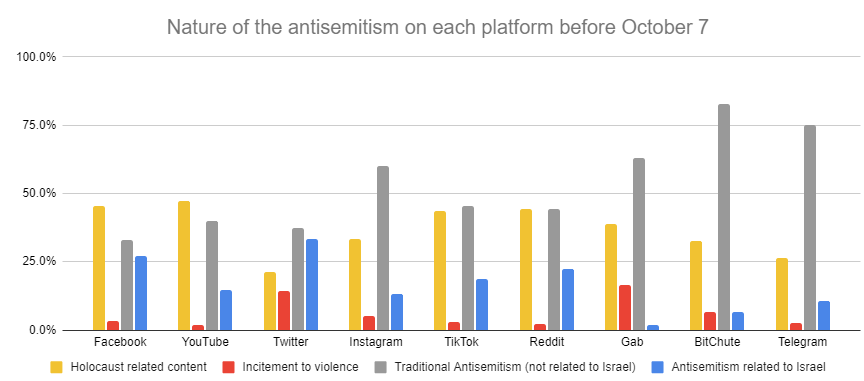This report from the Online Hate Prevention Institute was completed just prior to October 7 in partnership with the Executive Council of Australian Jewry. It provides an update to our Online Antisemitism in Australia 2023 report released in August 2023, extending the data collection through to the end of September 2023, and increasing the sample size from 372 items to 636 items.
As a result of the terrorist attack on October 7 and subsequent events the report was not published as scheduled. Instead its data became a baseline for comparison for our new report Online Antisemitism After October 7 2023, the result of intensive online monitoring and analysis by the Online Hate Prevention Institute (Australia) and Online Hate Task Force (Belgium). We are releasing this report together with the new report as it provides not only the statistical analysis, but also examples of what antisemitism looked like online prior to October 7.
About the Report
This report examines online antisemitism across ten social media platforms in the year leading up to the October 7 terrorist attack in 2023. It provides an in-depth analysis of the nature of that antisemitism across each platform, using four major categories and 26 sub-categories. It also examines the effectiveness of platforms in responding to user reports related to antisemitic content. The report gives both empirical data and examples of the nature of the antisemitism seen. Important in its own right, it has become an important baseline to examine the dramatic change as antisemitism skyrocketed after October 7.
The report examines 636 items of antisemitism from across X (Twitter) (23%), Facebook (14%), Telegram (12%), TikTok (10%), Instagram (9%), YouTube (9%), Gab (8%), Bitchute (7%), and Reddit (7%). The same amount of time was spent collecting data from each platform, making the volume of antisemitism collected a reflection of prevalence of antisemitism on each platform and the ease with which it can be found. Particular attention was paid to Australia content which makes up 37% of the sample. As most of the content will be visible from anywhere and impacting all countries, this is a report of importance far beyond Australia.
Across all the data, 45% of the content involved traditional antisemitism, 31% problematic Holocaust related content, 18% Israel related antisemitism, 6% incitement to violence. When examined in more detail, the nature of antisemitism varies significantly by platform. Traditional Antisemitism was the dominant form of antisemitism on Telegram (75%), BitChute (83%), Instagram (59%), Gab (63%), TikTok (44%) and X / Twitter (37%). Holocaust related content was the dominant form of antisemitism on YouTube (47%) and Facebook (45%). On Reddit these categories were roughly equal (44% each).

The report provides explanations about the four major categories and 26 subcategories of antisemitism and real examples showing how these types of antisemitism manifest in social media. It also provides important recommendations, particularly for Australia in tackling online antisemitism.
Next steps
- See Online Antisemitism After October 7 2023 which details how antisemitism changed after the October 7 attack.
- Support our work by making a donation on our donations page
- Join our mailing list to stay updated, see the bottom of this page
- You can also follow us on Facebook, LinkedIn, and X (Twitter)
- Individuals wishing to report antisemitism and contribute to our work can do so via our Fight Against Hate platform. See the reporting section on our Antisemitism page.
We welcome statements of support for this work from those academics, civil society organisations, Jewish community leaders, politicians, and government officials working to tackle antisemitism.
We are also looking to expand our monitoring capacity, working with organisations around the world. Our model for this work is for local organisations to engage a team of volunteers or staff to monitor online antisemitism. The Online Hate Prevention Institute provides training, management, and tools to ensure consistency and quality. Data is shared with participating organisations while also contributing to our global pool of data driving reports like this one. We welcome support from donors to enable this expansion.
